#it's poetic. powerful. real Season Cycle magic feeling you know?
Text
some say the goat will end in fire
some say in ice
from what I've read on the Wikipedia page of past Goat-destroying efforts,
I'm pretty sure none of us were reckoning on absolute swarms of hungry birds
but birds are also great
and will suffice
#I'm genuinely ok with this.#it's poetic. powerful. real Season Cycle magic feeling you know?#real flowers growing out of skulls stuff#that said. there IS a second goat--#natter
22K notes
·
View notes
Text
S4 Ep40: Fixing Dartz By Not Actually Fixing Dartz
Yo Merry Christmas, I’m quarantined as hell, so I’m just streaming and playing video games until my problems get vaccinated away.
So lets just write about Yugioh because hell a lot didn’t go as planned this year (can you believe my 2020 goal for this blog was to finish ALL OF YUGIOH?) but although my goals were halved and quartered--With this blog I don’t freakin care anymore, and somehow...that’s how it’s one of the few creative bastions I have left standing.
Wild.
I’m so done with the internet, I’m not even updating twitter right now.
But hell yes, lets update the Yugioh blog.
So onward, with the last episode of this season. We last left off with Yami getting devoured by a hate tornado which is just...a lot of 2020 energy. This whole season, in a nutshell is just...2020 energy, honestly. And this tornado is just twitter. It’s just twitter incarnated.
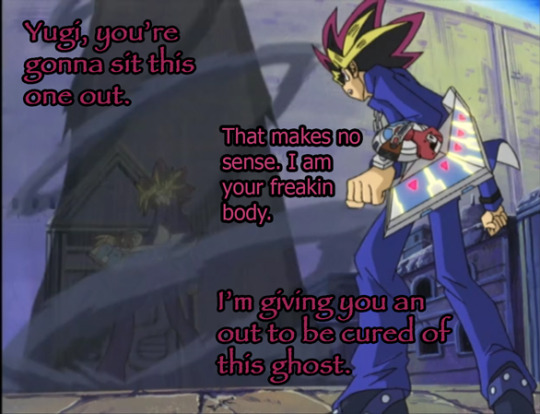
Rather than try to save himself and consequently fix his ghost problem, Yugi has decided to keep himself haunted by fixing Pharaoh’s inner emotional problems. Really is something, isn’t it? To do low key therapy for the ghost that basically...put you in therapy? Yugi can help fix his problems but like...he’s still a mess of problems because of it. Now Yugi shouldn’t walk away, of course, that’s effed up, but it is a little irony there.
Pharaoh, of course, has decided to submit to the hate tornado, and sees it as a manifestation of his own anger and bad vibes.
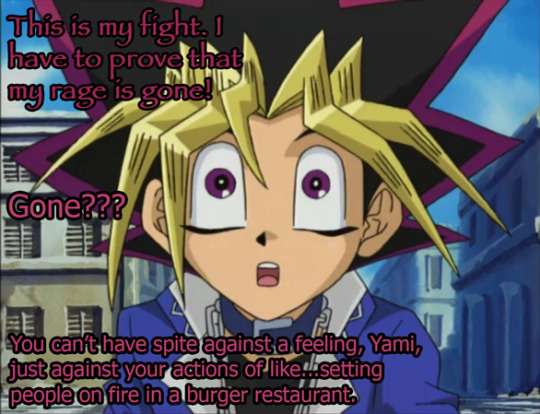
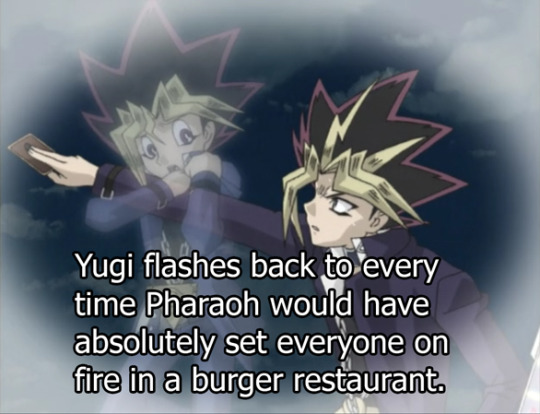
Isn’t that’s the real problem we have when we have to confront the feelings we don’t want to confront? Where we tend to feel guilt and hate for being upset, which is just sort of a thing humans naturally tend to do--instead of actually working on controlling what you do with those feelings so that way we stop lashing out and setting everyone on fire in the burger restaurant?
Like Pharaoh should be learning to count to 10, not trying to just remove his anger. This has sort of been his problem for a while--he assumes he can just...delete his rage. That’s not a thing. You can’t do that unless you have very specific medication through a doctor, and that’s why he keeps failing at it.
And this goes back to S1 when he “fixed” Kaiba and like nothing really happened. Pharaoh’s decided to wipe himself and like...it’s up to your own interpretation but like...in my book that Pharaoh brand clean cycle does freakin nothing. It gets reversed like constantly.
(read more under the cut)
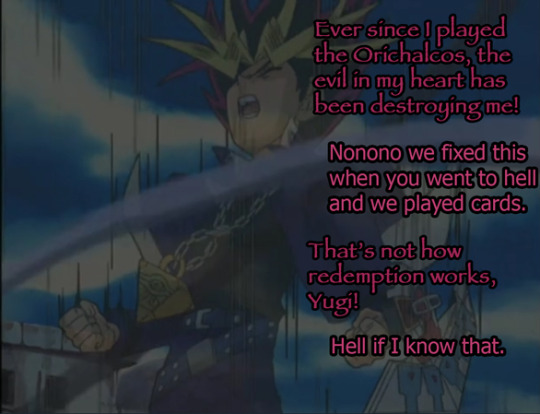

So Yugi decides to hit up Plan B, which is, honestly? Not a great message. But it’s the anime trope that we keep going back to because it’s the catch-all to make any anime protagonist into the good guy.
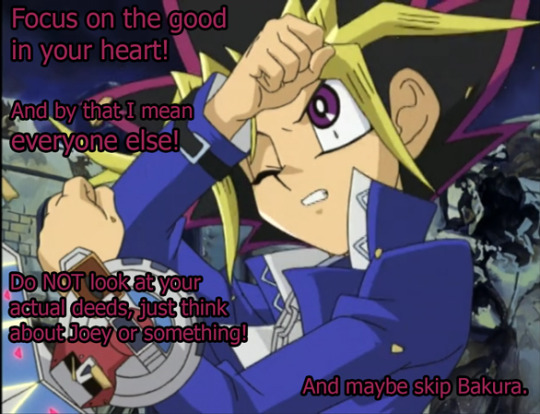
Like...
...
.......Yeah I’m gonna talk about it.
this is a trope that is so common it’s sort of ubiquitous with the genre. You gotta have the protagonist give up on their own strength, and be lifted up by their pals at the very last second--it’s like the anime hero’s journey.
But I really don’t like it. I don’t like the power of freindship. I’ll say it.
Because there’s some things you have to handle on your own. And I don’t think it’s a bad thing to have your main character show strength and show character development by doing things by themselves at the last minute. We already know that Pharaoh’s a good pal and believes in his friends--but like...does he believe in himself?
I can’t tell you if he does by how this episode goes, that’s for sure.
The whole point of this tornado is to see Yami discover his own strength and overcome his weaknesses...and yet he still relies on that good ol chestnut, friend powers.
Like last episode I feel like they did this already and it was way better--other people offered their help willingly, then Pharaoh got to have a big ol fight solo in the clouds to prove he was strong on his own as well. We finished the whole season last episode, so what are we accomplishing now other than a last minute secret boss fight?
Why would Yami doubt himself now? It’s weird. Yugi’s right to have mentioned “yo didn’t we figure this all out in desert hell???” because...we did. Yami is retreading old territory.
And that’s a thing that happens when you write, PS, when Yugi was saying “we already did this!” Yugi was reminding the writers of the show “we did this already. Like guys. We did this.” and sometimes when you’re writing, your characters will do that to you, and you should always be paying attention to cues like that.
Anyway, he vanquishes the hate tornado by thinking fondly of all of his buddies, and then the storm that should have been over the Atlantic Ocean, as according to the dub, parted in the sky above California.

GEOGRAPHY, the secret final boss of this season of Yugioh. And they failed. In a big way.

Yugi holds out his hands in real life, and pretends to hold a ghost that isn’t there. Now I want all of you to do this position IRL. Like that. OK. It looks like Yugi is holding onto a pair of ghost boobies.
Meanwhile, actual and very literal ghosts with very real bodies show up and start picking up Dartz and like...
...The ending of Dartz’ storyline is a TRIP! Lets just get into it!
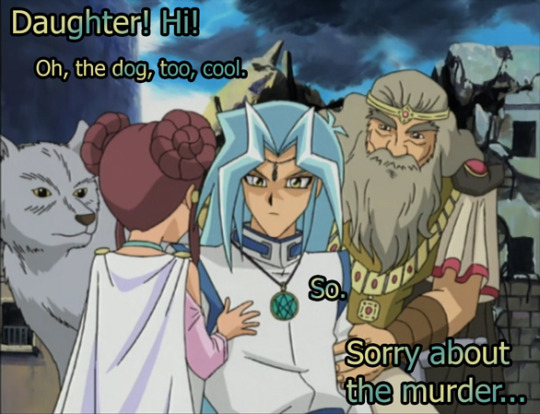
This cursed dog. I can’t stand how this dog is drawn. I hate it so much that I actually love it, and if I saw this in a thrift store I would impulse buy it and hang it over my fireplace mantle in a golden gilded frame.

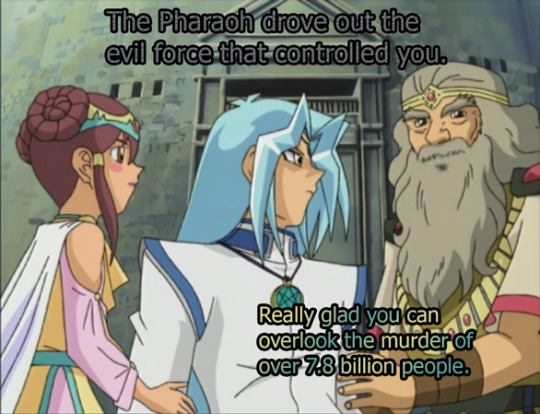
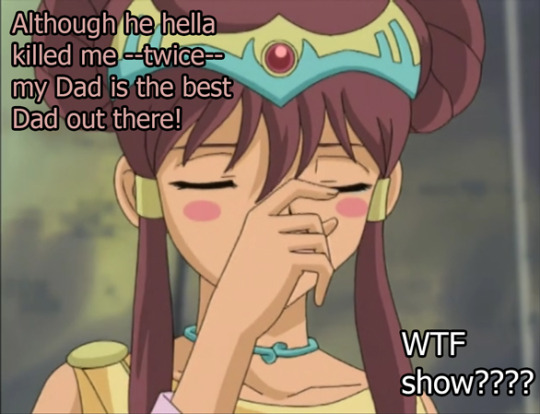
AHHH????
WHAT????
He electrocuted you with LIGHTNING! He killed your...everyone! He killed EVERYONE!
Also girl, how are you HERE? Like Physically??? I saw you die! TWICE!!
Yugioh is on SOMETHING with this one, and I think that “something” is called “we weren’t allowed to give you a PG-13 sad ending.”
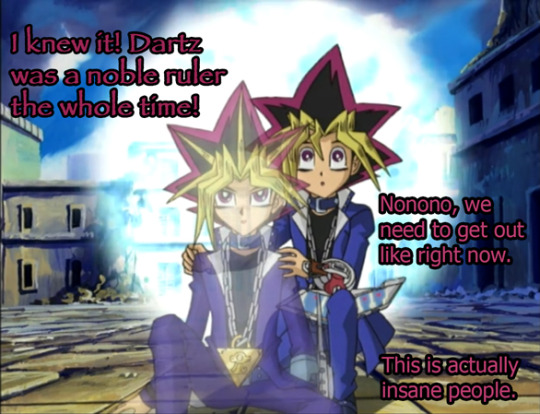
This is just the freakin weirdest thing. We have a character who is worse than Darth Vadar, and this show has pulled so many dark things in it’s history, but it just...
...it can’t punish Dartz at all, and I don’t know what they were thinking.
They have been poetic before--Pegasus got his eyeball gruesomely ripped straight out of his face, nearly got murdered by Bakura, and was not able to resurrect his wife. Noah hella died, had to give up his plan to rule the world and be a real boy, and had to murder his own Dad even, the moment he finally made a bond with his brothers. Marik had to lose all control of his body, live helplessly inside Tea’s bod for an entire season and accept the fact that he murdered his Dad and now has to live on without any of the magic that ever made him powerful in a broken world and a broken family he will never understand.
Dartz though?
If he does get some sort of poetic retribution, it will be off-screen because we don’t have time for it.
And that’s kind of a bummer because this is usually something Yugioh is kinda good at! I enjoy when this show goes dark, this is a great opportunity to do it...and they didn’t.
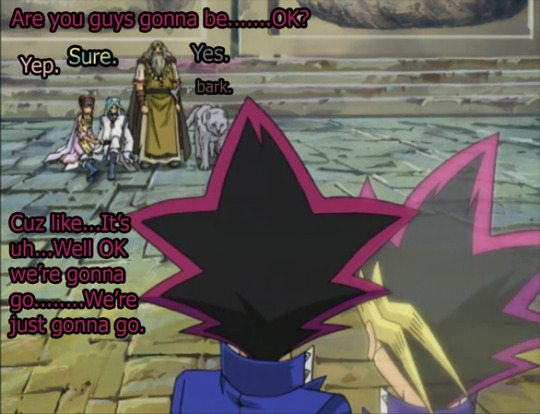
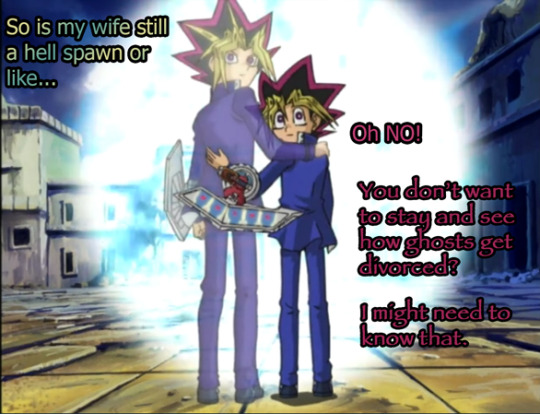
It was just the wettest fart Yugioh has ever played on me.
Just the wettest. Nice knowing you, Dartz. Glad you were here to murder everyone on Earth and then totes get away with it because we’ll just pretend like the Orichalcos was a totally different person--although it’s not. Because Yami JUST told us that it doesn’t work that way. Yami JUST told us that the Orichalcos was using his own pain and his own hate against him.
It’s not a separate person, it’s the same!
And to suggest that Yami vanquishing that hate tornado somehow cured Dartz of all his sins, is some upper level Jesus stuff that I don’t think this show would normally want to tread on. Straight up. Yami is a pretty poor stand in for Jesus Christ, and I feel I can straight up say that because it’s Christmas.
...what HAPPENED in the writing room with this one? Did they just run out of episodes? There are less episodes this seasons than other seasons have been.
Was it edited for the English version? Because I...kind of doubt they could edit that much to make it that drastically different.
I’m just boggled. Like usually I’m of the opinion to let the writers do whatever they do because I do not know what was going on behind the scenes, and I’m still of the opinion that they did the best of what they could do with the resources they were given.
BUT, this episode just feels...hella sus. I feel like they just had to make an ending. Any ending. Get an ending on there and finish the season before the power goes out and then run away with whatever paycheck you get (because in entertainment--you might not get one).

Seto and Joey made it completely back to the KaibaCopter before Tea was like “I mean it’s been 15 minutes, guys, you really didn’t hear him behind you? You really lost his tiny pitter patter of his little shoes? The little shoes that make a little tinkly noise like a kitty cat’s collar? A little kitty cat collar that he also wears around his neck? His neck that has a golden pyramid held by a tow chain that makes a little clanky clank when it hits his two belts covered in metal rivets that makes a little singsong clippity cloppity noise every time he so much as breathes? He’s a walking talking Bell of Notre Dame, you lost him?”
and Seto was like “Oh damn it, I know he’s the same size as Mokuba, and so I should be really good at not losing this kid but also have you noticed how many times I’ve lost Mokuba???”
Joey just looked into the distant tomb hut and said “......You’re kidding me.” and decided to immediately run back because Joey Wheeler knows what’s up.

Had Joey Wheeler actually made it back to Atlantis, he would have seen Dartz and his entire family hugging it out and would have immediately socked the guy straight in the dick and it would have been a great way to finally give Dartz just one single consequence for murdering everyone on Earth but you know, I did not write this episode.

I’m really glad that in the same episode that Yami called upon the powers of friendship, his friends hella ditched him to vanquish in a watery grave.
This is wild!

Seto’s words were “Good riddance” as the island went down, and you could not tell if he was talking about the island or about Yugi.
That and Kaiba Really Hates Islands. LOVES watching an island go up in smoke (or underwater, in this case). Loves nothing more.
Seto, your powers of friendship were just used to save the world.
Apparently the standard for friendship power is...not much. But they did just make Yami, of all people, do a literal Jesus in Gethsemane so...the bar for morality is just not very high in this anime.

Did the Great Leviathan stitch Weevil Underwood’s body back together or something? This is...
...Yo Weevil are you immortal now? Are you the big bad in S5 that comes out of nowhere and kick’s Bakura’s ass back to the Shadow Realm like Marik in S2? Because I’ll accept that.
I won’t like it, but I’ll accept that.


MMMMMMMMMMMMMMMMMMMMMMMMMMMMMMMMMMMMMMMM
look at those toddler shoes worn by a full adult! Weevil Underwood is so over-designed for a super low-level miniboss and I low key love that they love Weevil Underwood this freakin much.
Of all people, Weevil Freakin Underwood.
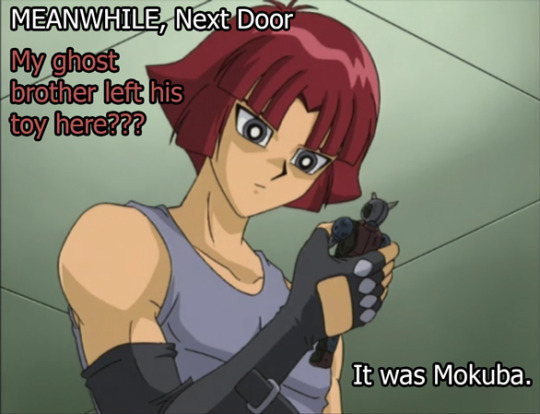
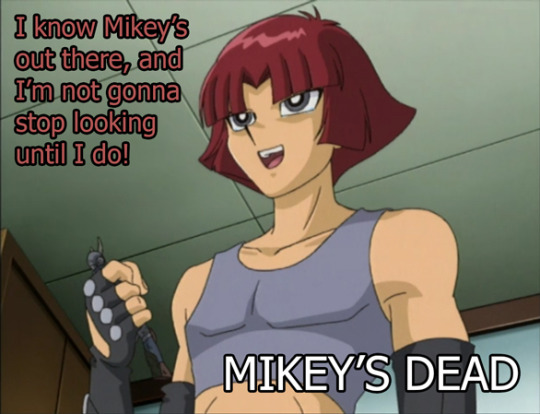
Listen, listen, listen.
If Mikey was still alive, he’d be older.
He’d have been older in that Leviathan tummy, he’d be Alister’s age but he’s not. He’s uh...
Yo show that got real dark. Show this is what you should have done to Dartz. I love this sort of dark ending for a rude asshole who is going to try to put his family back together although it’s completely impossible--this would have been a good Dartz ending. But...whatever. It’s fine.
We’ll...let Dartz have his family back, it’s fine.
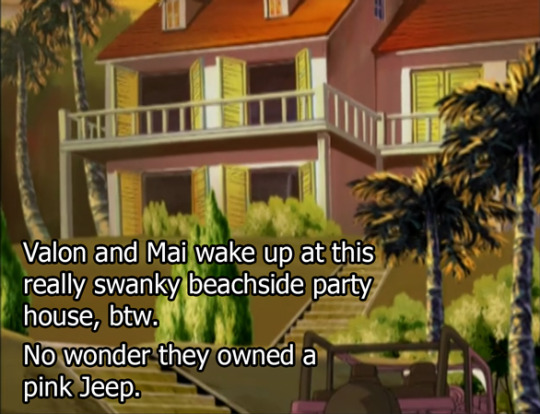

Meanwhile, in the first actual picture of California that really feels like California, Valon immediately accepts the fact that Mai left him.
This is also a great dark ending for Valon. To accept that the people in your life have moved on and that you, too, must move on, even if it’s alone. This would have been an excellent ending for Dartz.

And then Mai just bounces. She does not seek out Joey Wheeler, because she’s like “I have to fix some stuff, I have some serious problems, and it’s going to take a really long time before I can get over my toxic past.” and just freakin leaves us. Sorry, anyone who was hoping Joey and Mai would smooch at any point, it’s uh...it’s not legal yet.
And TBH I don’t even know if Valon is legal either, and the show decided to not reveal that to us, or allow them to smooch.
And as for Raphael? Uh...
They didn’t bother, I think. I didn’t cap it, at least. But we did get at least one person washed up on a beach.
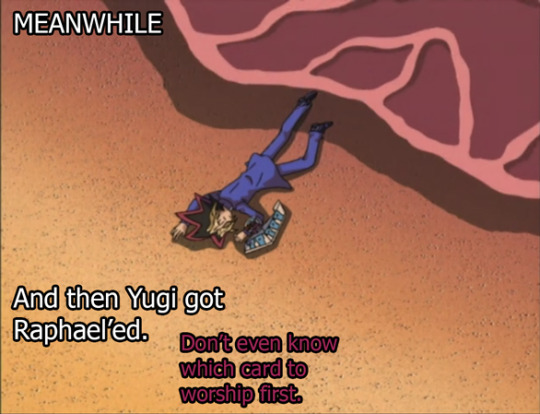
It would be Kuribo.
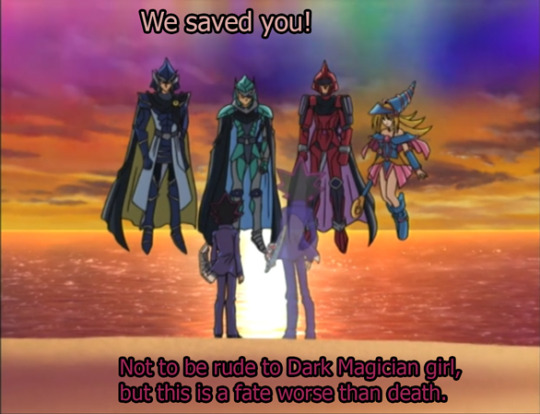
I talk about 2020 energy a lot in this season but like...wild 2020 energy here, to be so freakin chill and can I say--delighted--to be stranded on an abandoned island.

The show does not elaborate any more on if the cards are dead or alive, or if the games we are playing are with actual people forced to play these horrible games for us. It’s best that they don’t tell us. Just like Mr Mime. No one wants to know.
Mr Mime as in the Pokemon Mr Mime, PS, I just realized that there is a mime in this universe and he’s just...I don’t really want to know about that guy, either. All mimes honestly, I don’t want to know anything at all about all mimes.
Luckily, for Yugi, Kaiba didn’t fly very far from this island, and so we don’t have to have some sort of weird season cliffhanger where we guess how long Yugi can live off of coconuts (2 hours. he would last 2 hours on this island)
Although it would be such a cliffhanger to wonder what Yugi’s hair would look like after that. the same, right? Like it’s the same amount of grease and nasty stuff? He’d just have his roots growing out?

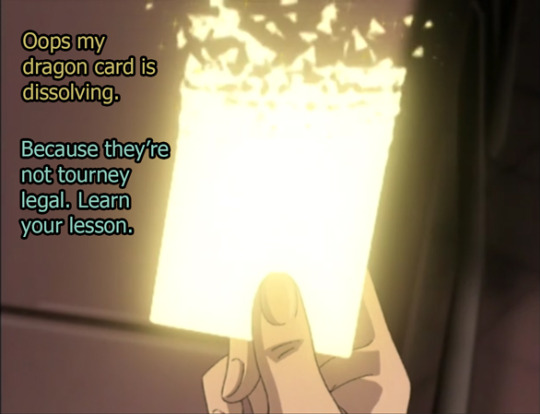

And there they go--goodbye Dues Ex Machina Cards. Either the show can’t keep you on board because you’re hella broken, or the three dragon warriors died, or retired, or whatever it is when a card is like “I’m done with humanity, please leave me alone and never call me again.”
Did Seto low key just break up with his side piece just now? Tragic.
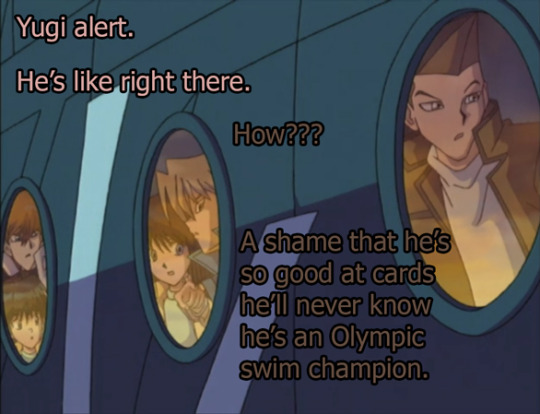
Remember that time that Yugi was so bouyant he was armpits out of the water in S2? It’s crazy how bouyant Yugi Muto is. Like if someone did one of those anime cross-sections of his anatomy, he needs like 3 or 4 duck shaped pool floaties in there.
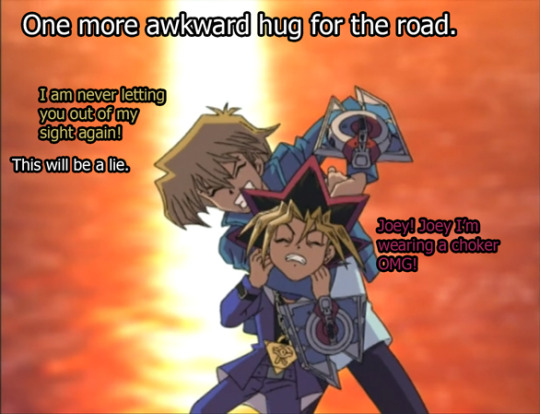
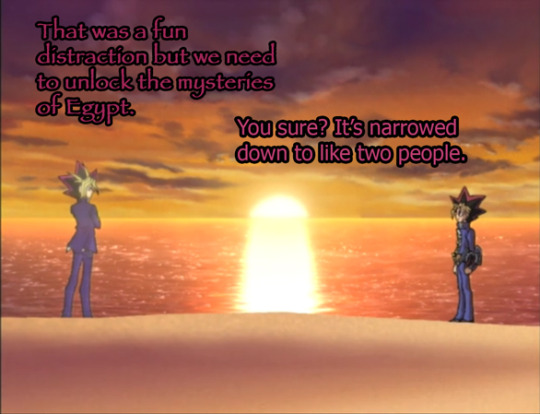
Now, full disclosure, I have written the ending to this post 3 times because tumblr keeps deleting this post out of my drafts folder (I shouldn’t be writing this in my drafts folder, being real, it’s been really buggy lately, and I’m gonna have to make a different solution to this) So I’m just...
...gonna end on this note. This exciting note that Bakura is next. Finally, Bakura (JK of course, because apparently Bakura doesn’t show up for half the season. Bro told me this and offered that we should skip that filler and of course I told him that is not the point of this blog and we will be watching all of that gruesome filler piece by piece. Because for someone, out there--that filler is their favorite episode. I don’t know who you are--but get ready for filler.)
Now Yami could just...call up Bakura at any point at his house and make an appointment to end the world...but maybe S5 will go a different direction? We shall see.
Anyway, that’s it for this Season! Thanks all for sticking with us when I just...didn’t have an upload schedule for this entire year. It’s been a YEAR. But, I’m hoping for good things in the future, and that things will adjust back to a normal upload schedule and that...hopefully tumblr won’t die or something weird like that.
I’m gonna finish the Full Metal alchemist Live Action movie next (we’re like halfway through) and then after that--onward to to S5! See y’all there!
Stay safe!
(and here’s the link to read these in chrono order if you’re new here:
https://steve0discusses.tumblr.com/tagged/yugioh/chrono
#ygo#yugioh#Yu-Gi-Oh#yugi muto#yami muto#joey wheeler#tea gardner#seto kaiba#tristan taylor#mokuba kaiba#alister#valon#Mai Valentine#Weevil underwood#Dartz#Rex Raptor#S4#Ep40#Yo I cannot believe these ruthless writers just let Dartz off the hook wowowow
57 notes
·
View notes
Note
I feel like a power boost/change of some type would be Tommy’s best bet for becoming a less forgotten character (the show might boost his popularity but I want nothing to do with that). Any thoughts on what such a thing could be, if it would differ from your thoughts on making pietro and Wanda have more even powers? His ability to vibrate things (up to and including whole buildings) until they explode seems underutilized already and seems more Wanda hex-power-mutation than straight speedster imo
I've said it before, but there is a lot of redundancy between Tommy and Pietro- nearly the same powers, nearly the same look, nearly the same personality-- but I don't think that his powers are the real problem. Billy and Wanda have the same powers, but Billy's a boy and he's developed a unique look, and he's part of a very popular pairing. Kate's another great example-- there's nothing she can do that Clint can't, but she is, I'd say, the most enduring character to come out of Young Avengers, in no small part because she's a cool girl with a really well-developed personality. Tommy doesn't have a different enough look or attitude to really set him apart.
It's not that I think Tommy's a bad character-- he really shines in YA Presents, Children's Crusade, and even the Runaways crossovers. In the main series, though, he's underutilized and underdeveloped. He came in right at the end of Young Avengers (2005), and had minimal presence in the 2013 run. I genuinely think that if Gillen had done something better with Tommy, he would be an infinitely more visible character today. It's my least favorite thing about that book, and that plot thread is objectively the weakest writing choice in an otherwise tightly constructed story.
Anyways, I just think somebody needs to give him a chance. He needs a makeover, and a recurring role in an ongoing series. He should've been in West Coast Avengers or Death's Head.
But, anyways, if you wanna talk about powers, I've always felt like Tommy's vibration... explosion... thing was kind of weird. I don't think he should be able to transmit kinetic energy like that based on how his powers are supposed to work, but the answer is probably that physics don't have to make sense in superhero comics.
Personally, I don't mind that the older and younger twins have the same abilities*, and I don't think anything good comes from changing a character's powers just because we can't think of anything better to do with them. I kind of feel like tacking something onto Tommy would feel like that time they tried to give Wolverine heat claws. It's unfortunate that "super speed" doesn't have as many variable applications as "magic", but that's the core of the problem we've been talking about: these characters are a poorly matched set.
Pietro's mutation is biological-- enhanced metabolism and localized superstrength balanced by appropriate bone and tissue durability = super speed. Wanda's powers are metaphysical, and thus more open-ended. If Pietro's speed had been conceived as space-time manipulation, for example, he might have enjoyed the same variation and evolution that Wanda has, rocky though it's been. As it stands, he's remained pretty unchanged, outside of a messy post-HoM period where he got jacked up on Terrigen crystals.
There have been a few instances where he's participated in magic, but as more of a conduit than an actual spellcaster. I've said in the past that I would be wary of Tommy and Pietro getting involved with witchcraft, but since the Maximoff family has been moved towards a fantasy-oriented backstory, I would like for them to have more opportunities to engage with magic. It might be a good way to learn some new tricks, such as manipulating kinetic energy, just to bring it full circle.
I want to talk about the last issue of Saladin Ahmed's Quicksilver mini-series for a moment. I know I've waxed poetic about this book plenty of times, but the gist is that Pietro is faced with a metaphysical threat that he can't defeat until he breaks out of the cycle where he uses anger to fuel his powers, and uses his powers as an excuse for his anger. Even though his pain and aggression are justified, he can't move forward until he can focus on clarity and compassion. It's basically Zuko re-learning how to firebend in the last season of Avatar. His relationship with his powers is fundamentally changed, even if his abilities are functionally the same, and it would have been a great opportunity for him to level up. Unfortunately, Pietro hasn't really featured in much, if any, stories since.
*I can't remember if I've brought this up before, but it's always been my headcanon that Wanda's sons were basically, like, slightly remixed clones of Pietro and herself. Vision literally can't contribute genetic material, and even if he could... she didn't get pregnant through intercourse, she spontaneously conceived on her own. I don't know how genes work, but neither does Marvel, and this has always been my assumption and that's why I stick to the idea that Tommy's mutation should be a 1:1 duplicate of Pietro's.
27 notes
·
View notes
Text
My first thoughts on 15x17
Behind the cut for head-canon and spoiler avoidance for them that wants ‘em
Chuck was writing versions. Each version had a different twist to set them on the path to Chuck's ending.
So what was the twist for this Sam-n-Dean that made them able to defy the narrative? Where was the moment that Chuck "screwed" his story and made actual free will?
I'll tell you what I think.
I think Chuck accidentally made one human with free will.
Only one.
Sam Fucking Winchester.
Sam can see and understand exactly what's going on. AND he is coming to realize that he is outside of Chuck’s control.
He knows Dean is being manipulated. Dean is clearly aware of it too, but he doesn't seem able to stop it. So what's the difference?
Sam told us, he told Dean, he told everyone, throughout the show, for 15 years,
‘It’s not who you are; it’s what you do.’
And because of this understanding, he relies on one particular trait of Dean's.
Dean will do literally anything to protect Sam. It's not always the right thing (he doesn't “always like it”) but in the end Sam knows and has always known the magic spell to trigger this trait in Dean. (call it “puppy dog eyes” if you want, but someone having blind trust in you, no matter what, is a helluva drug. Dean is addicted to it.)
But how come? Where did Chuck make his fatal error? What was the twist this time? The one that broke, not only the plot line Chuck wanted, but the character of Sam, as well. Making Sam incapable of following the narrative laid out before him.
I think the moment where Chuck made his mistake was the moment he had John hand the baby to the four-year-old. There’s a reason that’s the scene that kicks this all off.
A moment of extreme trauma and dire importance, literally burnt into Dean's brain.
Setting up this trait in Dean enabled Sam to truly push through any obstacle Chuck's story presented, because he knew Dean had his back when push came to shove.
Nothing bad was ever going to happen to him as long as Dean was around.
It's the song he grew up listening to.
"But," you say, "Everything that ever happened to Sam was quantifiable as ‘bad’!" (the joke of the only stroke of luck Sam Winchester ever had was that coffee cup landing on its ass is sad, but true)
Yes, and don't you think he has noticed that?
He’s given considerable thought to the fact he has survived this long with that much crap, against all odds, largely because of Dean. Anyone else would have been dead the first time and it would have stuck. Yet here he is. This has only reinforced the fact that Dean will try to do anything to save him. Not only will he try to do, he will succeed.
Without Dean he may have died at six months, or any time between then and now. It’s an important revelation when Dean tells Sam about carrying him out of the fire in season 1, Sam did not know that before then, but it makes Dean’s entire character snap into focus for him.
Sam has seen the pattern, he sees the hand of Chuck in their lives. He tries to break them out of the pattern over and over again.
Even before he fully understood what was happening and that it could be broken out of. Or that this was what he was doing. Before he was consciously breaking free, he still broke out of the plot.
Dean sees it too, he's not dumb.
But Dean's life did not belong to anyone, not the way Sam's has always been his responsibility. He only has Sam to help him break out of the hamster wheel, and I think they are just now seeing that.
I think Sam understands now, that for some reason, he is free and can refuse to do what is laid out before him. And, indeed, that he has been refusing his entire life.
He also understands that Dean can break out of the pattern too, but he needs Sam to help him.
Sam is the snapped fingers in the corner of Dean’s eye.
Sam is the trance breaker for Dean.
Sam is that moment of real panic that flooded his system when the house was burning and Sam’s life was in his hands.
That moment, that plot twist, is what broke Chuck’s story.
I’ve said before that the reason Chuck is afraid of Jack is that Jack was not written by Chuck, Jack is what the characters in the story wrote when Chuck left them alone (to go off and play with Amara), and in Unity Chuck admits there were things he “didn’t write”
So someone else must be writing things. When did that start, though? At what point did Chuck lose control of the authorship and accidentally allow another author into his sandbox?
Maybe when John Winchester handed a baby to a four-year-old. Maybe the reason Sam has free will is because he is also capable of writing in Chuck’s world. Or maybe he is capable of writing in Chuck’s world because he has free will.
What we saw in Unity was Chuck forcing his will on Dean to get to his poetic, tragic ending. He squeezed all of Dean’s rage up to the surface, and added more, he gave him an order direct to his nerve ending, squeezing his ink through Dean’s veins... “This time, fire that gun, boy!” Daddy’s blunt little instrument fed on rage and frustration and anger at being thwarted and impotence at being led on a string...
And Sam, again, snapped his fingers in the corner of Dean’s rage and broke him out. I think we saw Sam beginning to realize that he has the upper hand here.
And I don’t think Chuck has realized that Sam himself is, in fact, the issue.. yet.
Not the bullet hole, or Sam’s hope, or the demon blood, or the latent powers or missed destiny.
Sam’s existence and being are the issue. What Sam DOES, not who he is or was meant to be. Sam’s actual free will is the problem for Chuck. (and take a moment here to remember that almost every crisis Chuck wrote for Sam involved removing Sam’s agency and autonomy.)
He thinks they are all refusing to toe the line, I don’t think he understands that Sam is the one editing his book yet.
And what about Castiel? Well, the moment he shook hands with Sam, he was broken. His chassis may have come off the assembly line cracked, and Naomi may have patched him up time and again, but the second he shook hands with Sam, he was irredeemable for Chuck’s narrative.
Chuck inserts himself in to the story as the prophet, maybe to check in and see what’s going wrong? Figures out that Cass is broken (again?) and takes steps to make an opportunity to “remake” Cass. Then again, once back in Sam’s orbit, Cass is again, broken... there is something that cracks apart for Cass when he interacts with Sam.
This is not a shippy thing, btw. It’s being confronted with a creature that has actual free will... Cass is not equipped to handle that. He left the angel factory without that blind faith setting. He can ‘see’; and he ‘sees’ Sam. Every interaction with Sam shows him what is wrong with the rest of the story.
And again, Chuck rebuilds Cass, and this time traps him in a story where Cass himself is the villain. And Cass was a great villain, that was a good story, no matter how you feel about Cass or Misha, season 6 was a good story.
When Cass returns again, in season 7, hyperbole is gone now, he literally BREAKS himself upon touching Sam. There is no metaphor here, he takes on Sam’s brokenness, with a touch.
(”you’re broken [...]broken toys? You throw them away...”)
The only way Chuck could possibly hope to keep Castiel from being broken is if he can keep him away from Sam.
But Chuck hasn’t realized this yet. He tries to write a narrative that Naomi is “tuning him up as he transgresses” as she has in the past? or as she has in other worlds?
Is Dean what really breaks him free of Naomi?
No, touching the Angel Tablet does it... and again, this is just Chuck, writing his way to his preferred ending. The Narrative Cycle begins again because the Angel Tablet ‘resets’ Cass. This plot point starts us on yet another iteration of the “remove Sam’s agency so one of the brothers sacrifices either himself or the other” cycle.
~~~
Looping back again to the fifth season...
When Chuck says “endings are hard” in Swan Song he’s not talking about writing that ending. That ending was good, it was solid, it closed out the story on a note of melancholy hopefulness, Sam was gone, and the apocalypse averted. It wasn’t happy but it was complete.
That ending wasn’t hard to write.
It was hard for Chuck to read.
Because that wasn’t what he was trying to write, Sam took over his narrative. Sam refused to kill Dean, Sam refused to kill Adam, Sam refused to kill Michael or allow Michael to kill Lucifer, or allow Lucifer to kill either of Sam’s brothers or his own brother.
Sam effectively cock blocked Chuck’s little ‘fratricide 21-ways served in a light creamed-angel sauce with a side order of fried surrogate dad’ all you can eat and there’s dancing after banquet finale.
Cass comes back, almost immediately, because Chuck needs to re-boot the cycle. Because Sam screwed it up for him, again. (Maybe if Chuck takes Sam’s soul out of the equation... he can get some traction on his plan, this time.)
Sam Fucking Winchester is simultaneously Chuck Shurley’s hero, voice, protagonist, and muse.
He’s also Chuck’s biggest problem.
Sam Fucking Winchester is the corner Chuck has written himself into.
~~~
Now this is all just spit balling head-canon, and probably nowhere near where the writers are actually going, but it woke me up early and took over my brain and prevented me from doing my homework (which is also writing, to be honest) until I got it all out of my system.
~~~
Inserting standard disclaimer: (C-A-S-S is how they spell it on the show, and more importantly, it makes screen-reading software for the visually impaired pronounce it correctly; as opposed to C-A-S which makes screen-readers say “Kah.”)
#spn#spn spoilers#spn 15x17#spn Unity#Sam Winchester#Dean Winchester#chuck shurley#Jack Kline#Castiel#Cass#non-shippy#head canon#spitballing#writers lie#alternate theory#posted 10-30-2020#Spelling it Cass is screen reader friendly
9 notes
·
View notes
Text
she-ra season 3
i LOVE scorpia
this show has a bit of tonal issue in my opinion. they keep going back to a very teen-parent relationship between the trio and mum - when there’s a terrible war on.
people get killed but generally it really does just feel presented like a game or a fight about curfew and sometimes thats a bit jarring. (or is it strange to expect the graveness of situations to bring out a quality of sincerity even during puberty?)
i don’t really understand why Adora would jump to the conclusion that Shadoweaver showing up means she’s changed
but Adora, you ARE stupid. lol
but the rest is too. ‘don’t listen to her Adora’ why not? is it so terrible to be from another world? the stakes are quite murky
Entrapta’s comments really go to show how shit of a leader Hordak really is. HOw the hell did he manage to create this empire when he’s so damn incompetent? OOOHHHHHH CATRA SAID IT!!! just after i wrote that sentence she SAID IT
Hordak is an idiotic beserker
so why didn’t they take their unicorn flying steed?
‘well yeah - but you said that while saving us - so - you can’t be all bad. what do ya say’
i love the voice actor for Adora lolololol. she is clearly having SO much fun.
and Adora has a small crush on Huntara and absolutely ruins her chances with the barmaid by popping up. totally did not expect that voice for Huntara tho
entraptak is.....real. wtf. it’s.....cute. Hordak is just trying to be Prime. Failing at it miserably, lashing out. jfc it’s an endless cycle isn’t it.
‘know about she-ra? ahahahaha! I AM she-ra!’ THAT WAS BADASS. i love it when Adora is being rowdy and cocky
oh wow reversed chin-tilt with sword, and then lifting her head and soulful look? She-Ra really has chemistry with ALL the Princesses.
I LOVE scorpia. i loved that moment when Catra pushed her away nobly - i love how Catra has plausible deniability to herself. Love how the narrative reinforces that Catra is literally the most competent person around etc. (if they could get her for the Rebellion it would be over and out but hey)
surely Mara cut Aetheria off to save it from Hord-Prime’s war? Light-Hope wanted She-Ra to join the other She-Ra’s (’this world’s she-ra’) in the battle but she decided to hide the world and people she loved, breaking most of the magic-tech system. What I don’t understand is - the First Ones lived on Aetheria, but the people that populate it now are a different quality of organics, they can only survive in a specific atmosphere. The princesses are living components in the balancing of the tech-magic system...what are the people of the world? We don’t realise this most of the time, but all of them except for princesses, are animal-humanoids (and...kyle.....). What does this mean? Did the animal life unintentionally evolve? Were they an underclass - simply part of the system? (seems too edgy for this show).
‘why was i taken from my family? why was i forced to become a soldier?’ this line was GOOD
yesss!!! Mara! i love her already.
Scorpia is blushing lol. I am also liking Catra being completely off her shits careless and powerful.
Catra and Scorpia bonding yesssss!!!
ohhhhhHHH the magic of the planet is something of Aetheria itself! the tech is just latched on??? First Ones were colonisers (’settlers’)! but AETHERIA is what’s dangerous to the rest of the universe!!! (because it can be used as a weapon??) probably Aetheria would die as a result?
‘maybe it’s been a week, maybe it’s been thousands of years’ that is so fuckin sad
Catra being so hung up on acknowledgement is her greatest tragedy.
wow Scorpia really proposed a super cool thing and it could rearrange Catra’s WORLD
I want this show to stop repeating the same cycle after this last one time of Catra going: WAAAAHHH Adora made my life so hard now im going to do something inadvisable that might destroy us all as payback
Adora’s greatest tragedy is that she’s so self-centred that she doesn’t understand Catra at all.
if they have Angella and Glimmer fight and then have her mum die before they’ve made up i’ll be very upset (i’m not really loving Glimmer and Bow in this so far - they’re toeing the edge of annoying). and the fights about having to have plans and fighting or not fighting due to the fear of losing people - that’s always been uhhhh - well they always got away safe with shit plans and i just really don’t think that they’re meshing the commander-queen and daughter-mother stuff well. because there’s literally NO ONE ELSE in charge. there’s some magical queen and some villagers and a barely present guard. where’s the court, the advisors, anybody??
it would be silly to trust Shadoweaver (she did mercilessly torture you - no psychological effects from that stupidly enough), but i am hard-pressed to think of a reason she’d betray them.
still don’t understand how Frosta went from icy, frosty queen to idk a kid. i mean she can be both, but it was weird to see no uhhhh connection at all
I think this show is about how every single character is held back by their inability to grow and grow closer to others. Glimmer has disobeyed Angella SO often, why is she surprised at all? Why can’t she be honest and say: I am afraid! I am afraid I will lose you! I am afraid of that pain and I want you to take the risks seriously, to plan for them. I want to protect you!
That Glimmer would work with her torturer is of course a ridiculous notion. that is to say - if that kind of thing was properly given weight.
why fight Catra??? Why not just teleport to Hordak’s inner sanctum?? it’s stupid. why waste all the damn power
glad entrapta finally heard from Adora that she didn’t mean to leave her behind though.
‘you can’t fight them they’re too strong!’ ?? Glimmer just got sucked dry tho? like what. the way this show always postpones its fights on shitty pretexts is ....acceptable but pretty roll-eye-y
Catra burning all her bridges.
“there’s no choice” fucking bullshit, just teleport lol.
lol Catra feeds the anti-princess propaganda right back to Hordak. that’s poetic but jfc i really hope next season is going to be a little less *shuffles deck, cards end up in a million different hands, literally all cards feel betrayed*
so catra is willing to pull the annihilation switch on the universe just to one-up Adora just this once LOLLLL. if only somebody hadn’t ingrained a deeply seated inferiority complex in this cat
anyway i want her to feel the consequences of all that for a change
that animation on everything going VWWWWWWOOOOOOMM darkness was awesome
OHHHH the next episode has an awesome premise.
can i just say that i LOVE this episode. it’s so damn creepy and cool and kind of nostalgic. and i LOVE that it’s Scorpia and Adora who are remembering things - the ones closest to Catra. AND THEN THEY BOND!!!! and hold hands!!!!
reliving the betrayals. love the way the memories hit people, the way Catra goes from her old self, their playfulness, their casual violence ratcheting up at each other because that’s how they’ve been trained - to defend themselves, and then - the true Catra, the hysteria, gone so far off the deep-end. “i’d rather let the whole world be destroyed than let you win.” geeze that’s rooted deep.
angella and mica are so cuteeee. but angella really hasn’t changed has she? no tolerance for difficulty. she honestly is a bit of a shit queen. thought that was bc of grief and trauma but eh
he puts a truth spell on her but then he doesn’t believe her? does he think she’s crazy?
don’t think i’ve ever shipped something as hard in this show as Mica/Angella. i just LOVE royal woman x good man apparently. I LOVE IT SO MUCH. god why didn’t she kiss him on the lips>????
oh SHIT, MARA IS STILL TRAPPED INSIDE THE PORTAL LIKE ENTRAPTA SAID - THAT’S WHY SHE SAID: HAS IT BEEN A DAY OR THOUSANDS OF YEARS?
so...is there a reason that Angella is not faded?
wow that speech about bravery and cowardice. she truly. TRULY, ok they made something of her. I HATE losing Angella because the voice acting is INCREDIBLE. but that was actually an amazing end. (and she got to see Mica for the last time, at least)
ok so if i lost my mum forever i would be SCREAMING in pain but i guess these itsy bitsy tears from Glimmer will do?
that look of pure determination and anger and mercilessness in Adora’s eyes at Catra? nice. wish Catra didn’t go into a sulk at it but kept her goddamn FEAR (Adora was totally right, she vanquished another demon from her past - everything Catra did, she CHOSE to do. and her keeping on blaming others is simply - cowardice)
#anyway#that was a very good season#but i am not sure about this glimmer and angella thing#it still feels totally fuckin#weird#even more so now#kdslabf#sdjabj#sdjakfj#my stuff#she ra#vidi
4 notes
·
View notes
Text
Review: The Stone Sky by N. K. Jemisin (The Broken Earth #3)
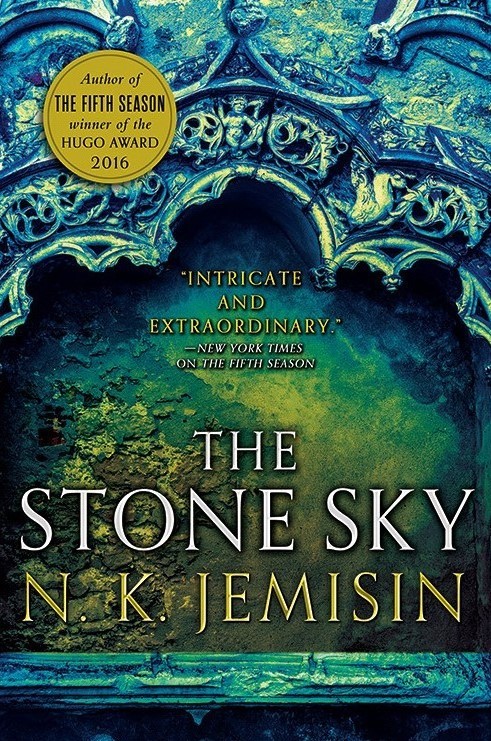
Length: 398 pages.
Genre/Tags: Fantasy, Science Fiction, Apocalyptic, Post-post-post Apocalyptic, Dystopia, Female Protagonist, Antagonist POV, First-Person, Second-Person, Third-Person, Gray Morality, Dark, Great Worldbuilding, Great Character Development, LGBT Characters, Diverse Cast, Trilogy, Perfect Score
Warning(s): This is probably the most optimistic of the trilogy, but it’s still not a happy series. Abuse/torture, slavery, graphic violence and gore, and major body horror. References to child death.
My Rating: 5 / 5
**WARNING: THIS REVIEW (INCLUDING THE SUMMARY) CONTAINS MAJOR SPOILERS FOR THE FIRST TWO BOOKS. IF YOU WANT A SPOILER FREE REVIEW, PLEASE READ MY FIFTH SEASON REVIEW (X), OR, BETTER YET, JUST READ THE SERIES.**
My Summary:
The reckoning of the world has come. Essun, who has lived a life of suffering and loss, finally has a home to call her own. But she is one of the last living humans who can harness The Obelisk Gate and return the Moon to the world, finally quelling Father Earth’s rage and ending the apocalyptic Seasons forever. She knows such an act will cost her life.
Her daughter Nassun, meanwhile, has seen that the cruelty of the world cannot be reconciled. More powerful than her mother, she seeks the power of The Obelisk Gate for another purpose— to end the suffering of others, forever.
And finally, Hoa reveals the origins of himself and the other stone eaters— the immortal, humanoid statues who have their own stakes and motives in this conflict. His is a chilling tale of a utopia built on the suffering of others… a cycle humanity seems unable to break, even 40,000 years after the Seasons began.
Does humanity deserve another chance? Only one will decide the fate of the Earth.
Time grows short, my love. Let’s end with the beginning of the world, shall we? Yes. We shall.
Minor spoilers and my thoughts follow.
Here’s my dilemma— this is the final book in a series, and I find it impossible to talk about any final entry without reflecting on what came before it. For better or worse, everything ties together somehow in the last book. In this case I’d say “for better”, because this book was great, and an excellent way to conclude a thought-provoking and wonderful trilogy. But nevertheless, I’ll probably be discussing the series as a whole in this review.
So, yes, this was a really good conclusion. Definitely not where I expected things to end up, based on the opening premise, but that’s not a bad thing, and it’s been interesting to see how the story and characters have molded and changed. Honestly, I don’t have some master plan on how to style this review, except by discussing all the different parts of the story that really clicked for me.
I’m a sucker for “fate of the world” type stories, and I’m glad that The Stone Sky finally takes this direction. It’s really something to see how far Essun has come. She starts as a scared little girl hiding in a barn and is now a forty-something woman with the destiny of humanity in her hands. You can see all the steps that lead her to this point, but there’s something truly epic about any story that includes such a level of growth. It’s been an often-painful ride, but one I’ve really enjoyed nevertheless.
Obviously, I have to talk about the characters. Everyone was SO interesting. Even characters you were supposed to dislike initially had fascinating development over time. Schaffa is the obvious example, as we saw in The Obelisk Gate, but that continues in The Stone Sky as well. In this one there’s a minor antagonist from the previous book who gets called out on her bullshit and… changes her behavior accordingly. Hell, the leading antagonist of the entire series, Father Earth, the force that has caused the death and destruction of billions of people, has justifiable motives.
And you look at Essun, who is generally a good person at heart, and some of the terrible things she’s done (which is ESPECIALLY relevant since the narrator likes to see the best in her). Her daughter Nassun fills the “destroy the world” role, but even her motivations for doing so come from a place of compassion. It’s… interesting, to say the least. And that’s not to say that there aren’t minor characters who are pretty awful the whole time, but those are noticeably the irredeemable bigots, which makes sense for the type of story being told here.
You know what I mentioned in my Obelisk Gate review (x) about gray morality? Yeah. Everyone major is a complex character. Who knew?
As for specifics, I already named most of my favorite characters in my Obelisk Gate review, and that pretty much continues here. There are some new faces introduced (or re-introduced) in this one, but for the most part the focus is on an established cast, emphasizing how they’ve grown and changed over time. There’s plenty of examples. Essun, despite everything, has started to move past a lot of her trauma and open up to other people. Nassun has her own found family in Schaffa, but nevertheless continues to spiral down a destructive path. Probably the most significant development in this one is Hoa, our intrepid narrator, who finally reveals his origins and backstory. I found him fascinating because he directly states his motives several times, yet we don’t really know his intentions until this book. It’s been a ride back and forth, but I think he’s probably one of the most interesting characters in the series. He’s a far cry from the minor helper character he seems to be at first.
While the first two books had snippets from Hoa’s perspective, he becomes a full-fledged perspective character in The Stone Sky, and reveals a lot about the world and general themes of the story. This entry also humanizes him a great deal. We already knew he identifies as a human, that he’s one of the oldest stone eaters alive, but not necessarily what that means to him until now. Most of his story explores how the world got to its current, cyclical apocalypse-state, tied to the origins of the stone eaters. Despite the time leaps, Jemisin keeps it all relevant and interesting; it never feels jarring to switch between disparate perspectives. That’s true for the other books as well, and I think it speaks quite well of her writing. One really satisfying part about Hoa’s perspective in this entry is we get an actual, canon explanation for why he’s narrating Essun’s life in second-person. Over the course of the series he lapses into first-person sometimes, or narrates in a very stylistic way, and all of that starts to make sense too. There’s even solid reasoning to the whole unreliable narrator thing! It was a nice touch to tie off the series.
This entry into the series also gives us a chance to look at long term worldbuilding. Specifically, there’s a LOT of slow burn/long con details about the world that we finally figure out here. One really interesting detail is the concept of “icewhite eyes”. Basically, it’s a rare eye color that’s commonly seen as a bad omen. The Fifth Season seems to play this straight; two named characters have icewhite eyes. One is the then-monstrous Schaffa. So, bad omen, check. The other is Hoa, who we figure out pretty early isn’t quite human (at least how we see it), and has mysterious— possibly sinister— intentions. So, check off the bad omen there, right? Except BOTH of these characters develop in unexpected ways. Schaffa becomes— of all things— a strong father figure for Nassun. Hoa is, well, Hoa, and full of spoilers, but it should be obvious by now he’s a pretty complex guy. Finally, in The Stone Sky, we learn where the negative beliefs about icewhite eyes come from, and it is… well, pretty fucked. It’s obviously allegorical, but the reader doesn’t really get the extent of it until this book, which makes it all the more insidious. It ties wonderfully to the anti-bigotry, anti-oppression themes of the novel, and does so by completely playing the reader.
This is just one example of many, and I’m willing to bet this series is a fun one to re-read due to all the future context. But now to focus on things that generally apply to the series, rather than something this book in particular focuses on.
Generally speaking, there are things about the world that I really like, now that I’ve had three books to consider them. One big thing that played with my expectations was orogeny as a concept; for all intents and purposes it feels like this world’s version of magic. But as the series goes on you learn orogeny isn’t magic at all; just an evolutionary trait future humans picked up (I mean, the term “oroGENE” implies this, but…). Not only that, but traditional magic does exist, and is very relevant to the story. The stone eaters were also super interesting. They were way different than most generic “fantasy races,” and getting their backstory in this entry made them even more compelling to me. They’re uncanny and sort of creepy at first, but the more you learn about them the more explainable their behavior becomes.
I’ve talked so much about the things I like about the series that I’ve neglected to mention the writing itself… it’s very good. Exquisite, even. I’m not sure how else to describe it— Hoa has a very strong voice— humorous (often bitterly) and cognizant of the little details. I loved the fun poetic bits that experiment with typeface and line breaks. There’s even a part where The Important Words Were Capitalized, which felt so natural with how people type now that I’m surprised I haven’t seen it much in literary works. The trilogy was very fun to read based purely on the writing. Even if it had been lacking in content, which it wasn’t, I think I still would have enjoyed it purely for the craft.
Certain themes are omnipresent in this series, and there were several that really struck a chord with me. Obviously, the cycles of oppression the characters face are allegorical to the real world. One thing I REALLY like about this series is how much it defends the downtrodden, something I feel mainstream fantasy often fails to do. So many series seem to WANT an oppressed class in their fantasy world, then are completely apathetic to what that means, or don’t bother to challenge the issues such an inclusion brings. It’s like “oh, well, this happens in the real world, so I should have some sort of allegory for racism/sexism/homo/transphobia”. Not so here— The Broken Earth is about the full implications of oppression and why it’s so wrong, why it’s so unjust. The Fifth Season’s dedication reads “For all those who have to fight for the respect that everyone else is given without question” and honestly that was the point I knew this series and I were going to click. Just because we are looking through a fantasy lens does not make these things any less horrible or ugly, and I’m glad the series takes such a strong stance against dehumanization and oppression.
Another overarching theme I was surprised impacted me so much was that of parenthood. A character early in the series says “Children will be the ruin of us.” It’s a haunting line in context, and thematically it sticks through the rest of the series. Essun’s motherhood is a central part of her character— striking because initially she has no desire to be a mother. She is, arguably, not even a very good mother in the traditional sense— but her protectiveness of her children ultimately defines a lot of the story. It’s hard to go into detail without broaching major spoiler territory, but it’s a consistent and heart-wrenching theme that persists all the way to the end. That particular line is literal for many, many events in the story.
I discussed representation in my previous reviews, so I won’t retread that much, but stories like this prove just how easy it is (and should be) to be inclusive. It makes sense that the cast is so diverse in this series, because it is very much about the oppressed and the issues they face. Wouldn’t make any sense to have that central concept, then focus on a bunch of straight white guys. But that being said, I think this series is a great example of how writing can be better in terms of representation. This is the only fantasy series I’ve ever read where the main protagonist is a 40-something black mother. And there should be much, much more out there. Since getting into this series I’ve found myself looking critically at a lot of mainstream entertainment, and its failure to represent minority groups beyond a few token characters. It was a problem I was aware of, but this series makes it look so easy that I find myself even more annoyed that most people don’t bother.
I’m not going to lie— The Broken Earth is a pretty bleak series. A lot of really horrible shit happens to the main cast. Hell, the opening premise is that (a) a toddler was murdered by his father, and (b) the world is about to end forever, killing millions of people. Most of the early content focuses on a brutalized slave class, hated by society for the crime of having a certain evolutionary trait. But the series is also about the small moments of hope that shine through despite these things. Happiness and compassion are worth celebrating, because they remind us that there is something worth fighting for in the world, no matter how hopeless and awful things seem. We see characters who are victimized and beaten down ultimately come into their own truths and find their own families and reasons to live. So yeah, it’s a dark series, but I wouldn’t have had it other way. I hope someday I can meet N. K. Jemisin to thank her for writing these. They’ve given me a lot to think about.
#god this was such a good series PLEASE read it#also i put so much effort into this review.. i don't think anyone will read it because Spoilers. but.#taylor reviews#taylor reads#5/5
11 notes
·
View notes
Text
ASTROLOGICAL PROFILE —— Fran P. Maryland
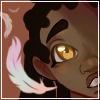
PISCES NEPTUNE— The dreamer and healer of the horoscope family, Pisces energy awakens compassion, imagination and artistry, uniting us as one.
Pisces is symbolized by two fish swimming in opposite directions. A part of you is always trying to “swim away” or escape reality. The other part is so intuitive that you get swept up in everything going on. Your imagination is the perfect hideout when you want to escape, since Pisces is so creative. You love dancing (Pisces rules the feet), movies, poetry, and music. Your moods are mysterious and your dreams are intense. Every Pisces should have a journal by your bed, since some your best ideas will come in your sleep. Although you can feel helpless, you’re much stronger than you think. The best way for Pisces to experience your own strength is to help people in need. You have great compassion and incredible healing powers. Because it’s easy for people to make you feel guilty, Pisces should watch out for friends who use you, or make you doubt yourself. Surround yourself with good-hearted friends who have their acts together. Many people born under your sign have a “tortured soul” quality. Finding a tranquil spiritual outlet, or spending time alone, can help you get re-centered in your own power.
Symbol: The fish
Element: Water
Ruling Planet: Neptune
Body Part: Feet
Good Day: Romantic, helpful, wise, comforting, imaginative
Bad Day: Gullible, self-pitying, out of touch with reality, self-destructive, clingy
Favorite Things: Dancing, romantic encounters, laughing and crying, walks on the beach, long poetic letters
What You Hate: Reality, throwing away the Christmas tree, drill sergeants, daylight, bad design and noisy music
Secret Wish: To find unconditional love
How to Spot Them: Large and dreamy eyes, soothing voice, glamorous “silver screen” look
Where You’ll Find Them: Printing photos in the darkroom, people watching in the shadows of an underground club, holding hands under the table at a romantic restaurant with a sunset view
Keywords: Dreams, Fantasy, Healing, Compassion, Karma, Mystery
PISCES - THE FISH
Ruled by the enchanting and elusive Fish, Pisces is the sign of illusions, darting in and out of the shadows. Is it real…or just a mirage? Celestial sleight of hand is the Pisces forte. Much like a siren, Pisces energy lures you into its depths—but it can also leave you drown you in the emotion ocean. Compassionate Pisces is empathic, absorbing and reflecting the feelings of everyone it contacts. This is the “old soul” of the zodiac: As the final sign Pisces is said to have experienced the energy of every other sign before it. Soulfully deep, Pisces energy never just skims the surface. In fact, this sign rules the subconscious and governs our dreams, imaginations and unhealed wounds. The essence of Pisces energy is romantic, helpful, wise, comforting and artistic. Negative Pisces energy can be gullible, self-pitying, out of touch with reality, addictive, self-destructive, clingy and masochistic. During a Pisces planetary transit, we need to set boundaries and avoid playing the martyr, codependence, and rescuing troubled souls.
ELEMENT - WATER
Pisces is one of the three zodiac signs ruled by the water element. The other two water Signs are Cancer and Scorpio. Since Pisces is the third and final water sign, it streams Cancer’s sentimental waves and Scorpio’s forceful jets into the ultimate emotion ocean. With Pisces energy activated, expect to dive deep. Pisces energy awakens our compassion, opening our hearts to people who are struggling. Under a Pisces planetary cycle, we can expect to wear our hearts on our sleeves and feel intuitively connected to those around us, whether or not we’re consciously aware of that energy. We may also express ourselves emotionally through creative channels: music, film, the visual arts, and dance are all ruled under the Fish’s domain.
RULING PLANET - NEPTUNE
The planetary ruler of Pisces is Neptune. The Ancient Romans praised and glorified Neptune as the almighty God of the Sea. When Jupiter and Pluto (or Zeus and Hades, as they’re referred to in Greek mythology) met with Neptune, they divided the three main realms of the Universe—earth, sea, and underworld—amongst themselves. Neptune was feared for his furious temper, which could incite earthquakes on land and intense storms for those away at sea.
A MUTABLE SIGN
The zodiac signs are grouped into three “qualities” or “triplicities”: cardinal, mutable and fixed signs. Pisces is one of the four mutable signs. These signs end every season—and have learned the hard lessons taught by spring, summer, fall and winter. The mutable signs—Gemini, Virgo, Sagittarius and Pisces—know that all good things come to an end, and their role is to prepare everyone for the changing of seasons. Mutable signs are the adapters of the zodiac, a little bit older and wiser. More flexible and comfortable with change than other signs, they can “chameleon” themselves to fit into a variety of situations. Mutables are also the editors of the zodiac—the ones who complete the package with a winning touch. A plan can be sparked by a cardinal sign, built by a fixed sign, then perfected with the critical eye of a mutable sign.
WHAT PISCES ARE LIKE
Pisces people are sensitive and intuitive, and can become easily overloaded by crowds or overstimulating environments. It’s often hard to pin these people down, because they’re so keen on swimming away to a place where they can experience some downtime and meditative R + R. Pisces can gain a reputation as flaky because of the way they swim in and out of your life. When they do surface, Pisces make charming and magical friends, especially because they view life through rose-colored glasses. These fantasy-fueled folks need to keep at least one fin on solid ground. At their best, Pisces are attentive and inspiring. You can find Pisces artfully composing a photo, listening to music or guided meditations in their Zen dens, people-watching in the shadows of an underground club, or holding hands under the table at a romantic restaurant with a sunset view.
TAGGED BY: @sparkadream
TAGGING: im a weenie so uhhh, feel free to do this if you want to!!
#* What is Your Story || Musings#♘ On Her Own Wings#* beast scrawling#* god i took forever to decide on what to do for the icon jfhdsbf
1 note
·
View note
Photo

This month we’re showcasing an author in the fandom who has written popular works such as Quite magical and A promise of forever. Pat is on ao3 as WendigoBaby and on tumblr as @maghnvsbane, and we’d like to thank her once again for taking part in the OML author showcase!
1. When did you start writing fics? Tell us a little of your journey as a fic writer.
I believe I was 13 when I wrote my first ever piece of fiction (a really bad story about a lady assassin able to turn into a panther, don’t even ask) and it snowballed from there. For two or three years I used to do fics for this French cartoon called Code Lyoko, before moving to original stuff - it was a great exercise for keeping personalities and plot consistent, while also dabbling in character design. Then forth came Shadowhunters and I fell so hard for this show, that I’ve been stuck writing for it almost exclusively since the end of season one, with a small phase dedicated to The Raven Cycle.
2. What fic of yours are you most proud of and why?
My Simple blessings piece holds a special place in my heart, as I’ve poured a lot of emotion into it; the relief related to being able to love and be loved in return, the joy of domesticity and the intrinsic beauty of the world (or maybe I just love waxing poetic). The other one I’m proud of from a more practical standpoint is fire & gasoline; describing fighting is always a bit of a challenge, because you have to imagine all of the movements and stitch them all together into something that flows and reads comfortably, allowing the reader to imagine it all in their head. With that fic I feel like managed that quite decently and I'm proud of it.
3. Who is your favorite character to write and why? Which character do you find the most challenging to write?
My favourite is definitely Alec, since I relate to him in many aspects, both life and personality-wise: we’re both perfectionists, a little closed off and wary of newcomers, but tender and with a lot of love to give beneath a hard shell. Also we both love Magnus Bane, so there’s that. On the other hand, I feel like Simon is the most challenging one and it may be a strange answer, but his kindness and his specific kind of rambling, pop culture-related humour is hard to capture for someone more quiet like me.
4. What is the hardest part about being a fic author? The easiest?
Starting the fic and then bringing it to the finish line, definitely - the longer I work on a piece, the more doubts I get whether the idea is even worth the effort. Probably because the more I read over the same sentences, the more predictable they get and start to feel like boring writing, even when it’s only in my own head. I also get distracted fairly frequently by new concepts, which ends with me surrounded by half-finished fics that gather dust on my desktop. The easiest? Getting an idea - inspiration comes from anywhere and with time I start to hoard these little thoughts that one day may be born into full blown pieces - sometimes all it takes is half a sentence heard in a grocery store two aisles over.
5. What inspires you? Where do you find your muse?
Anywhere and everywhere, but most often from songs and aesthetic pictures I come across on tumblr. Other than that, it's movies, tv shows, video games, real-life conversations or even random things I dreamed about (although those tend to get a little strange and I don’t think should be turned into fanfiction).
6. How do you power through writer’s block?
I cry. No, to be honest, I just try to keep going. I write the most awful, kitschy sentences imagined and yell (complain and whine, more like) about them to my friends until it gets easier and my creativity flows again. If that doesn’t work, then I let myself take a day off, go outside, do something with my family or friends, or just start something new because pushing too hard for will just make everything worse. Consuming new media also helps - going to the cinema, reading poetry or books, listening to music you'd never think you'd enjoy, anything to widen the horizon of your imagination and get yourself out of your comfort zone.
7. Do you have a favorite fic from another author?
Oh gosh, so many! Some Kind of Wonderful by magnusragnor/@magnusragnor (the best lifeguard au i’ve read ever, well-paced and characterized, I fell in love immediately and it’s one of the first fics that comes to my mind when someone asks for recommendations), and my heart is set on you, plus all of the single parent aus by @lightwoodlesbians /ohprongs (Charley has one of the most incredible styles with great natural humour and in-character writing; she is also one of the only people who can make me like children in fics), hold on to me (cause i’m a little unsteady) by ceciwrites/@daddariossmile (this just stuck with me, the soft way they interact, the whole concept of skating the way it’s used here, 10/10) and Appassionato by Chonideno (this moved me on a deeper level, the love of music included in this, passion written into every word, the original take on the concept of a first meeting, I love it all).
8. What’s something you’re looking forward to in season three of Shadowhunters?
As for Magnus and Alec, I’d love to see them have more conversations about the differences between them without death in the form of Valentine looming over their heads, as well as more casual intimacy and domesticity (hand holding, hello kisses, more hugs, a training scene, I’ll take anything). We’ve got a taste of Battle Couple, which I hope is just an introduction to more great scenes with them as a team. In general, I’m looking forward to Luke’s conflict with nosy Ollie (plus his hot date with Maryse) and more backstory on our favorite Downworlders - Simon and how he’ll get out of the Seelie Queen’s grasp, Maia’s and Bat’s growing connection. I miss this show already, I want to know everything!
9. Can you give us a sneak peek to what you’re writing next? Or at least any hints to what’s to come?
I tend to jump between ideas quite a lot and I like keeping them under wraps, so no sneak peeks from me! But as I’m looking at my to-write list, I can tell you to expect more domesticity, more canon fics with a sprinkle of aus and/or meet-cutes. The one I’m working on right now involves immortal husbands, pretty countrysides and a title inspired by one specific French song, maybe you can even guess which one it is?
10. Do you have advice for anyone who might be interested in writing fan fiction?
First - don't be afraid to start and second - keep going even if you don't feel like it. Writing good fan fiction takes a lot of trial and error as well as practice. My first fics were all around awkwardly written and as I continued with different ideas, I did get better. When it comes to finding the right balance for characters, it's good to read well-characterized fic from other writers plus meta posts as those tend to give an explained look into the character's personality. And if you're not sure about something, don't hesitate to ask others, just don't give up.
11. Does having English as a second language challenge you as a writer?
In some ways, yes. Although since I’ve been using English for about sixteen years of my life, it’s become almost like an extension of my thoughts. That doesn’t mean I don’t get things wrong, because I do, mostly in the department of grammar (all those pesky rules). Some words or expressions don’t translate well (or even don’t exist) in both languages, so as someone bilingual I have to maneuver my way around those obstacles either by looking through a thesaurus or a dictionary (I always have those two open when I write). Yet, beside grammatical nuances, strange expressions that make no sense when translated from Polish, and confusing words, the worst thing about being bilingual is forgetting the word I want to use in both languages at once. I wouldn't wish that on my worst enemy!
32 notes
·
View notes
Text
Bright Wall/Dark Room November 2018: An Essay on Ingmar Bergman's Hour of the Wolf by Ethan Warren
We are pleased to offer an excerpt from the latest edition of the online magazine, Bright Wall/Dark Room. This month, in honor of #Bergman100, and Criterion's upcoming release of a 30-disc box set of his work, they're devoting our entire November issue to the films of Ingmar Bergman, looking to bring new & diverse perspectives to the legendary Swedish auteur's work. In addition to Ethan Warren's "Hour of the Wolf" piece "The Tumult Breaks Loose" below, they also have new essays on "Scenes from a Marriage," "Cries & Whispers," "Persona," "Fanny & Alexander," "The Passion of Anna," "Face to Face," "Summer with Monika," "The Magic Flute," "It Rains on Our Love," and an intimate, in-depth interview with frequent Bergman collaborator Liv Ullmann.
You can read our previous excerpts from the magazine by clicking here. To subscribe to Bright Wall/Dark Room, or look at their most recent essays, click here
Eighty-five miles off the coast of Sweden lies the island of Fårö. With a population of around 500 and an area of under 45 square miles, this is, in the words of a 2016 New York Times profile of the region, “Where Swedes go to be (really) alone.”
The shoreline of Fårö is dotted with rauks, stone stumps that were once grand arches before they were attacked by the elements. The wind and the surf would drive against the arches until cracks formed, and once those cracks were there, it was only a matter of time until one half of the arch could no longer sustain itself and collapsed into the sea. The other half of the arch might manage to stay upright for a while, but without its supporting half, it too would crumble, leaving behind just a rauk.
Fårö has no bank, no post office, no police force. “It can feel dangerous to be alone in the country for long,” Christine Smallwood wrote in that New York Times profile. “Being alone is a sign that something is about to go wrong, perhaps catastrophically so.”
And in 1968, it was here that Ingmar Bergman chose to tell his most horrific tale.
*
Hour of the Wolf is the story of a marriage crumbling in a void. Johan and Alma (Max von Sydow and Liv Ullmann, the ultimate Bergman power couple) have traveled to their remote island cottage to spend the season, but as we know from an opening title card, Johan will be gone long before the season is through.
Johan is a painter of some renown, but his professional success masks a turbulent inner life. As we’re told by Alma in a prologue delivered straight to the camera, Johan has a history of anxiety and paranoia. He can’t sleep at night—particularly not during “the hour of the wolf,” that predawn hour, as he explains, when nightmares become real—and he’s pestered by strange supernatural figures that he calls “flesh eaters,” drawing them compulsively until they’ve overflowed his sketchbook.
Johan is, in the old-fashioned literary sense of the word, mad. Bergman elides any proper diagnosis in favor of a more poetic depiction, the tormented artist as fairy-tale figure. And as you might expect of a storybook nightmare, it’s not long before Johan’s madness is made flesh. The demons step out of Johan’s sketchbook and present themselves as grotesque aristocrats who wine and dine Alma and Johan at their gothic castle. They menace Alma and flatter Johan, digging their claws into the cracks in this marriage until they’ve torn it apart. By the end of the film, Johan has abandoned Alma and given himself over to these physical manifestations of his madness and all its seductive promises of freedom and relief.
Hour of the Wolf is often cited as Bergman’s one true foray into the horror genre, and the surreal hysteria that awaits Johan in his climactic visit to the castle is absolutely unnerving—a woman removes her face and drops her eyeballs into cocktail glasses; a man walks onto the ceiling while another grows wings. To me, though, the horror stories it calls to mind are the ones where a monster is loose in the house—except here the house is a marriage, and the monster wreaking havoc is Johan’s instability, a festering rot borne of his secrets and regrets. And that kind of psychic monster can’t be kept at bay for long. Soon enough, “the tumult breaks loose.”That line comes from the climax of the published version of Hour of the Wolf included in Bergman’s 1972 book Four Stories; it’s spoken by Alma as she cowers in the forest watching Johan’s demons tear him limb from limb. This denouement is entirely reconceived from page to screen; in the most significant shift, Bergman’s text has the demons badger and taunt Johan as they rip at his flesh, hurling contradictory commands (“Keep standing, don’t be afraid! Lie down and it will be quicker”), taunts (“Can’t you take a joke?”), and nauseating boasts (“He can’t talk because I’ve made mincemeat of his tongue”). In the film, the dismemberment is punctuated only by avant-garde sound effects.
That was the right choice. The demonic chant is pleasantly disturbing, but those impressionistic bursts and shrieks are so much more accurate; when your madness is having its way with you, it’s impossible to convey in words the havoc being wreaked upon your mind.
*
My own tumult broke loose in the spring of 2011. Just before my 25th birthday, I slipped into a manic episode with psychosis. For a week, I cycled from howling rage to howling sorrow, operating on increasingly erratic impulses as my rational self was devoured by a hyperactive id, one powered by incessant emotional neediness and savage retaliative force.
The primary witness to my breakdown was my girlfriend, Cait. We had met in college four years earlier in the kind of old fashioned story you’re not even supposed to hope for in the 21st century—she was the beautiful clerk at the school store; I had a massive crush and visited every day for weeks, buying things I didn’t need just so I could exchange a smile and a pleasantry while I worked up the nerve to introduce myself.
By 2011, Cait was spending most nights at my apartment near Harvard Square, so as my hours of sleep and my interest in food decreased, she was the one watching with mounting anxiety, and as my grip on reality crumbled, she was the one bearing the brunt of my flourishing paranoia. While my friends received alarming phone calls and it was my family who drove me to the hospital when it became clear there was no other option, Cait was the one beside me every morning and evening. She was the one in the eye of the storm, tasked every night with convincing me to stop ranting long enough to eat even one bite, saddled with my belligerent calls and texts throughout her work day. And when it all started falling down around me, it was Cait I punished.
I spent years dragging my way back to something resembling emotional equilibrium, but even by 2015, when Cait and I relocated to Connecticut so she could attend nursing school, my trauma and grief was too raw to touch with anything but the briefest remembrance. And living hours from my friends with a girlfriend who worked multiple overnights a week at the hospital, I turned to movies to give my life shape. I gorged myself, consuming anything I could put in front of my eyes. And so one night, I found myself watching Hour of the Wolf for the first time.
I knew nothing about the film, I was simply seduced by a cover depicting a shadow-drenched face shrieking with what might be maniacal laughter, mortal terror or both. I was no stranger to Bergman’s visions of terror, but as they tended to lie in the theological (the “Silence of God” trilogy) or cerebral realm (Persona and The Passion of Anna, two more Fårö stories of crumbling psyches), I was tantalized by the promise of the master stripped of any enigmatic subtlety. I wanted Bergman with the gloves off.
I forgot to be careful what I wished for. Hour of the Wolf hit me with brutal force, leaving me gasping and reeling as I struggled to process a story that was simultaneously alien and shockingly familiar. In Johan’s struggle to maintain a grip on his sanity in the face of his demons’ temptations, I recognized how easily I’d succumbed to my own worst urges, and the horrors that lay in store once I’d given myself up.Most painful was the scene in which a demon invites himself into the cottage and politely places a handgun on the table between Johan and Alma. The demon claims that he wants Johan to be able to defend himself from the island’s small game, but the metaphoric implication is clear: the forces of madness have offered the tool to conclusively sever any connection to the tedious responsibilities of sanity.
Out of any damage that I did during my psychosis, the memory that still ached the most years later was of the night before I was hospitalized. Supercharged with the raging energy of a collapsing star, I took a gentle plea from Cait—“You don’t seem like yourself and I’m getting scared”—as an excuse to unload a torrent of wrath. When my madness pressed that weapon into my hand, I used it without a second thought. Though my memories of the night remained hazy, what lingered was the feeling that I had wanted to destroy the only woman I’d ever loved. And then, just like Johan, I had surrendered to my madness, and all the freedom it had promised had been revealed as a lie.
Bergman had held up in my face, with stark, monochromatic objectivity, everything that had happened to me, a tangle of trauma I could barely organize enough to begin processing. For years afterwards, I would remember Hour of the Wolf as my own personal cracked mirror. But it would be years before I could really begin examining the same question that Johan asks when his demons show him his shattered visage: “What do the shards reflect?”
*
Alma’s greatest desire is to merge her life completely with Johan’s. On one of the long nights that she stays awake to keep her husband company, she muses, “I hope we become so old that we share each other’s thoughts.” This is no typical intimate union she wishes for; she yearns to become indistinguishable from her husband, even physically.
It isn’t her choice to sit up all night. “You have to stay awake awhile,” Johan has barked moments earlier. “Talk to me, Alma.” But he hides his face as she speaks, either unwilling or unable to engage. On first viewing, I felt Johan’s pain. But when I returned to the film two years later, I was startled to see the callousness in the gesture, a husband piling onto his wife the full weight of the night’s emotional labor.
Cait and I had been married nearly two years when curiosity, possibly half-masochistic, brought me back to Hour of the Wolf. I put it on late one night while Cait and our new baby slept upstairs, and though I was wary, I told myself that I’d already absorbed the visceral impact. Now I could view the film from an academic perspective, appreciate the craft.
Once again, I underestimated Bergman’s power; a film that had once been a blunt weight had sharpened into a razor. Perhaps it was the six years of therapy that had elapsed between my breakdown and this second viewing, but where I had once been so focused on Johan’s pain, I was now shocked to recognize the abuses with which he pummeled Alma, and her pain in every scene.
Johan takes up so much air in the film—and often so much of the frame, as in the aforementioned scene where von Sydow hunches in the foreground, filling half the frame with his face, while Ullmann sits in the background cloaked in shadow—that it’s easy to see Alma as merely a supporting player in his story. But when I made the effort to see the film through Alma’s perspective, it was as though the entire plot was inverted, causing moments that hadn’t even lodged in my memory to now stand out as the most crucial. I was devastated by the scene in which Alma sits Johan down with her ledger, forcing him to listen to her studious accounting of their household purchases—if she can’t find a way to see the world through his tormented perspective, then she can at least invite him into hers. And I cringed with agony and regret at the scene’s end, when Alma weeps in the face of Johan’s indifference to her gesture.
Bergman shoots this and so many other scenes of the couple’s strained domesticity in long, still takes with no cathartic cuts to guide your emotional response, leaving you stranded in each agonizing episode of a love succumbing to entropy. But despite the staid visuals, the film shifted beneath me to reflect something I’d never fully reckoned with: yes, I had been through hell during my psychosis. But I had put Cait through hell with me, driving the vehicle towards disaster with her as the helpless passenger.At the close of the film, Alma agonizes over all her unanswerable questions. Could Johan’s destruction have been prevented if she hadn’t loved him so much? Or if she had loved him more? I had glossed over the scene before, too focused on all the trials Johan had just endured, but now I ached for Alma—why couldn’t she see herself for the blameless victim she so clearly was?
As the screen faded to black, I thought of my week on the psych ward. I’d spent every day terrified to step into the phone booth and call Cait, unable to trust my tenuous stability enough to believe I wouldn’t lose my grip and do even more damage. When I was discharged, though, I opened my inbox to find it full of letters from her; she’d written to me every night that I was gone, even as she knew I had no access to email. She told me how much it hurt to know I was scared, and promised she’d be beside me for every step of my road to recovery. She wrote about the puppy her friends had brought over to distract her, and the therapist she had visited to make sure she was properly equipped to support me when I got home.
Reading the letters was a comfort, but it was a heartbreak, too. I had used the weapon my demons pressed into my hand, and Cait hadn’t run. How could I ever be worthy of her support again?
*
This is not the essay that I expected to write about Hour of the Wolf. I hadn’t seen the film in a year when I started organizing my thoughts, believing (in what I now should have recognized as a cycle of hubris) I finally had the film straight. I had my perspective locked down.
I expected to focus quite a bit on one scene that loomed large in my mind. In the second of Alma and Johan’s late-night vigils—which is, unbeknownst to them, the last night they’ll spend together—Alma murmurs, “It’s strange when the sea is completely calm. Scary somehow.” Seven years after my diagnosis, I still viewed my marriage as this calm sea—something that should be beautiful, but would always be defined the memory of a squall, and the question of when another might come.
When I sat down for another viewing of Hour of the Wolf, I felt secure in my understanding that this was the story of a marriage between an unstable abuser and his helpless victim. At last I could approach the film academically. But it shifted under me again, and this time that shift may have changed my life.
I waited to feel pity for Alma’s victimization, but scene by scene, something became clear: I had sold her short. Now, a bevy of holes sprang in my understanding not just of this story, but of my own. I had always wondered why in the world Alma stayed with Johan, willingly absorbing his onslaught. But as I mulled the film, I came to recognize I had robbed Alma of her agency, that in positioning her as Johan’s victim, I still viewed her through the lens of his experiences rather than seeing it as a shared narrative. And, I was ashamed to realize, I had spent years doing the exact same to my own wife.
Now, one scene that had always struck me as opaque finally became clear. As Alma and Johan walk home along the cliffs, shaken by their dinner at the castle, Alma’s pent up fear and confusion erupts. She whirls on Johan and lets him know that no matter what disaster they’re cruising towards, she isn’t going anywhere. She grabs hold of him, but her tone is defiant rather than pleading, and when she’s overcome and whirls away, she shirks his touch.
In Four Stories, Alma’s outburst is rendered from Johan’s incredulous perspective. “He realizes in a flash,” Bergman writes, “that her grief applies only to herself.” Alma is asserting her own needs, not merely pledging her devotion to him. She’s terrified of whatever might be happening to him, but just as much, she’s terrified over what might happen to her in the process. Their lives are too conjoined for his pain not to be hers as well, not just sympathetically but literally.This all may seem self-evident from an objective standpoint, but other people’s needs are a strange concept to grapple with when you see yourself as the protagonist of your nervous breakdown and interpret everyone else’s behavior through the distorting lens of your own perspective. When I managed to understand this scene—with a bit of guidance from Bergman’s prose—a tumbler fell into place in my own mind: by continually flagellating myself for what I’d done to Cait, I was casting our story as a one-way transaction rather than an interaction between two autonomous people.
I now saw that Cait’s letters during my time on the psych ward were as much for her as they were for me. As she noted in the first one, since the beginning of our relationship, we’d spoken every day, no matter whether we were in the same space or separated by half a world; now we were separated by only a few miles, but I’d been plucked out of her life entirely. I had always valued the letters as proof of our love, but until this most recent viewing of Hour of the Wolf, I had never really understood what it was they proved. Even if she knew I couldn’t hear it, Cait couldn’t go to bed without speaking to me. When she pledged to be there beside me as I worked towards recovery, the pledge wasn’t that she would hold me up, but that after all these years of falling deeper and deeper in love, we now leaned on one another so much that when one of us collapsed, the other couldn’t help but falter, too.
This lightning bolt shattered the essay I meant to write. But it may have just freed my marriage from almost a decade of my self-sabotaging self-pity, too.
*
Only after this last viewing did I take the time to untangle one of the stranger scenes in this strangest of films: during their visit to the castle, the demons treat Alma and Johan to a puppet production of The Magic Flute. In the scene performed for Alma and Johan, the hero, Prince Tamino, pauses during his quest to rescue his beloved, the fair maiden Pamina, from captivity. Alone and on the verge of despair, he asks two questions: Will this night ever end? And is Pamina still alive?
In his 1987 autobiography, The Magic Lantern, Bergman writes at length about his enduring fascination with this passage in Mozart’s opera. “These 12 bars,” he writes, “involve two questions at life’s outer limits.” In asking whether the night will ever end, Bergman saw Mozart as wrestling with his own existential terror as he began succumbing to his fatal illness. And in asking whether Pamina survives, Bergman argues, Tamino is really asking after the very concept of love. Bergman believes the question to be, “Is love real?” and the answer to be, “Love exists. Love is real in the world of human beings.”
There was debate following the release of Hour of the Wolf as to whether it’s Alma who stands in for Pamina in Bergman’s calculus, or whether Johan’s lost love Veronica fulfills the role, always taking for granted that Johan represented the conquering hero. Personally, I was shocked to realize anyone would see Alma as the damsel and Johan the savior. Perhaps the notion would have tracked on my first viewing, but by now it could not be clearer to me that if anyone in Hour of the Wolf is battling staggering odds to rescue their beloved, it’s Alma, and that it’s Alma who has the right to wonder whether love is strong enough to slay the forces of darkness. Johan is preoccupied with many things—primarily a lifetime of simmering guilt, regret, and shame—but the power of love does not often seem to be one of them.
After Tamino’s questions are answered, the demons are momentarily struck dumb, shaken by the affirmation. But they can’t be conquered forever. No matter how strong love is, the pain must come eventually. And it’s just a matter of perspective whether that impermanence is enough to turn a romance into a tragedy.
*
“I have this theory,” I told Cait recently, “that every love story is really a horror story.” The thought had been percolating as I mulled all these new revelations spurred by Hour of the Wolf. Nearly every story of a lifelong love, I explained, ends with one lover burying the other and being forced to endure in a world they’ve forgotten how to navigate alone. “I think the happiest ending to any love story,” I concluded, “is the old couple in Titanic lying in bed together while the ship sinks. They had a long life together and they never have to live without each other.”
I was so absorbed in my theory that it took me a moment to notice her appalled expression. “Personally,” she replied with enviable serenity, “I would rather live a few years without you and go peacefully than drown.”
It was hard to argue with that. Cait’s and my perspectives are frequently diametrically opposed; I spend my days submerged in Swedish psychodramas from half a century ago while she spends hers at a hospital helping bring new life into the world. And when we see each other at the end of the day and I tell her the fantasies I’ve cooked up in the course of my work, more than once she’s gasped, “This is what’s in your head?”
And the more I think about it, the more it seems like that might be how we survived our tumult. Neither of us has ever wished for the other’s worldview. And while any marriage is necessarily an arch formed by two people leaning on each other for mutual support, neither of us has ever so fully surrendered to the idea of us as a single unit that we couldn’t endure without the other. Because we’ve maintained that measure of distinction between us, avoiding the temptation to surrender our individuation the way Alma dreams of, then if some new tumult were to break loose and the worst befell one of us, the other might be able to stay standing and avoid becoming a rauk, an incomplete husk living on only as memorials to the past.
Though one can’t be sure, it seems unlikely that Alma will escape that fate. By the end of Hour of the Wolf, she’s so thoroughly cleft that even her sentences are severed. Trying to make sense of the trials she’s experienced, she remarks, “Sometimes, you get completely…”
But she loses the thread. She turns away, and then just before that final fade to black, she turns back to the camera, aching for an end to her agony, one it seems may well never come.
from All Content https://ift.tt/2Taf52X
0 notes